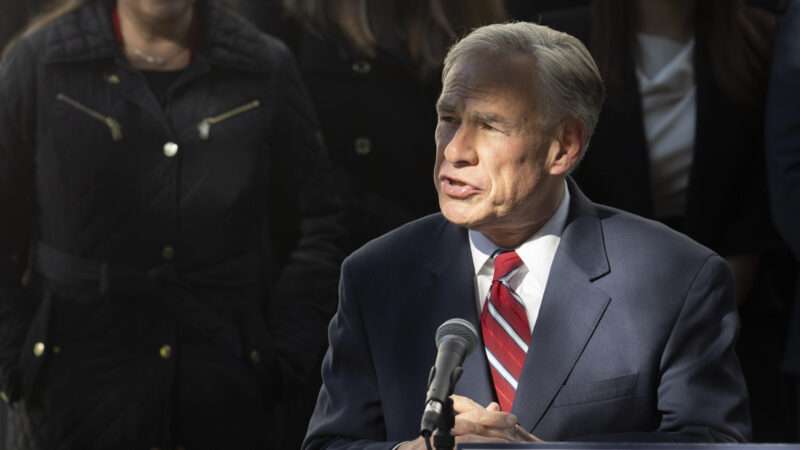
The Supreme Court ruled Monday that Border Patrol agents could cut the concertina wire that Texas placed along the U.S.-Mexico border to block migrants from entering the state, adding new fuel to an ongoing conflict between Republican Gov. Greg Abbott and the Biden administration.
Texas has continued to place razor wire along the border, and now 25 Republican governors—every Republican governor in the country, except for Vermont's Phil Scott—are backing Abbott's actions. The governors issued a joint statement expressing support for Texas "utilizing every tool and strategy, including razor wire fences, to secure the border."
The governors and Abbott claim that states have a "right of self-defense" under Article 4, Section 4 of the Constitution (which guarantees that the federal government will "protect each [state] against Invasion") and Article 1, Section 10, Clause 3 (which allows states to "engage in War" if "actually invaded," which Abbott says gives Texas the "constitutional authority to defend and protect itself").
This argument misunderstands the long-established legal and practical definitions of an "invasion." It also misconstrues the nature of unauthorized migration.
James Madison and other drafters of the Constitution, Abbott argued, "foresaw that States should not be left to the mercy of a lawless president who does nothing to stop external threats like cartels smuggling millions of illegal immigrants across the border." But "those who cite Madison in support of equating immigration and invasion ignore the one time he directly addressed this very question," writes the George Mason University law professor Ilya Somin at The Volokh Conspiracy, a group blog hosted by Reason. Madison did so in "the Report of 1800, which rebutted claims that the Alien Friends Act of 1798 (which gave the president broad power to expel non-citizens) was authorized by the Invasion Clause."
"Invasion is an operation of war," declared Madison. "To protect against invasion is an exercise of the power of war. A power therefore not incident to war, cannot be incident to a particular modification of war. And as the removal of alien friends has appeared to be no incident to a general state of war, it cannot be incident to a partial state, or a particular modification of war."
"Every court that has reviewed the question" of what qualifies as an invasion has interpreted it as "an 'armed hostility from another political entity,'" wrote the Cato Institute's David J. Bier for Reason in 2021. In 1996, California made the same argument as Abbott, saying that the federal government had failed to protect it against an "invasion" of "illegal aliens." But the U.S. Court of Appeals for the 9th Circuit rejected that: "Even if the issue were properly within the Court's constitutional responsibility, there are no manageable standards to ascertain whether or when an influx of illegal immigrants should be said to constitute an invasion." Besides, the 9th Circuit said, California ignored Madison's conclusion in Federalist No. 43 that the Invasion Clause affords "protection in situations wherein a state is exposed to armed hostility from another political entity."
This is where Abbott runs into another issue: Undocumented immigrants bear little resemblance to an invading foreign army. Despite the constant invocations of "military-age" men crossing the border (the fearmonger's favorite way of saying "young men"), there has also been a historic influx of migrant families. Large groups of border crossers marching through the Sonoran Desert or trudging across the Rio Grande may make good footage for media outlets intent on fearmongering, but the overwhelming majority are coming here for economic or humanitarian reasons, not to commit crimes or sow chaos.
What brings chaos is a lack of legal immigration pathways. When pandemic-era border restrictions were in effect, barring the vast majority of migrants from seeking asylum, "gotaways" (those who successfully avoided arrest by Border Patrol) were their highest since 2005. The gotaway rate fell by half once the Title 42 border order ended. According to a National Foundation for American Policy brief last year, "100 years of Border Patrol apprehensions data" indicate that "none of the three U.S. periods with a significant decline in illegal immigration were due to enforcement policies."
By and large, people are happy to go through the legal immigration process if the steps are clear and accessible—but right now, they tend not to be. It's up to Congress to pass immigration reforms that recognize these realities. Abbott's misrepresentation of the Constitution does nothing to help.
The post The Twisted Logic of Greg Abbott's Border Policy appeared first on Reason.com.







